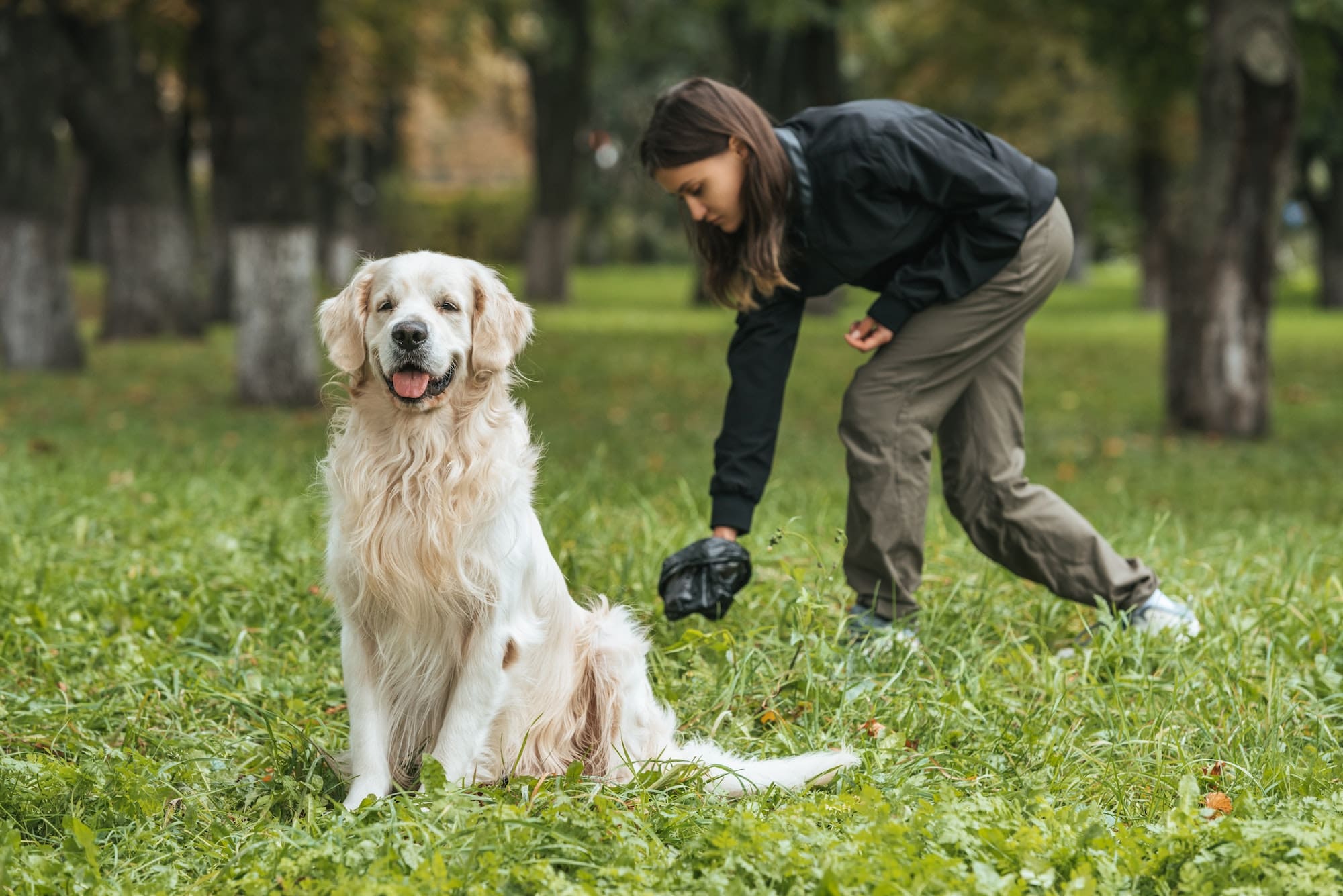If you're a new puppy owner, one question that may be on your mind is, “Is it normal for my puppy to have soft stools or diarrhea?” As your adorable fur baby explores the world and tries new foods, it's not uncommon for their digestive system to go through some adjustments. In this article, we'll explore common causes of soft stools or diarrhea in puppies, when to be concerned, and what you can do to help your precious pup feel better. So, let's dive into the world of puppy poop and find out what's normal and what's not!
Causes of Soft Stools and Diarrhea in Puppies
Dietary Changes
One common cause of soft stools or diarrhea in puppies is dietary changes. When you bring a new puppy into your home, it's important to introduce any changes in their diet gradually. Abrupt changes in their food can lead to digestive upset, causing loose stools or diarrhea. It's best to transition them to a new diet over a period of several days to allow their system to adjust.
Food Intolerances or Allergies
Just like humans, puppies can develop food intolerances or allergies. Certain ingredients in their food, such as grains or proteins, can trigger an adverse reaction in their digestive system, leading to soft stools or diarrhea. If you suspect that your puppy may have a food intolerance or allergy, it's important to consult with your veterinarian. They can recommend an elimination diet or perform diagnostic tests to identify the specific allergen and suggest a suitable diet for your puppy.
Intestinal Parasites
Intestinal parasites, such as roundworms, hookworms, or giardia, can cause digestive issues in puppies. These parasites can be contracted through contaminated soil, water, or even from their mother during birth or through nursing. In addition to soft stools or diarrhea, puppies with intestinal parasites may also experience poor appetite, weight loss, and a dull coat. Regular deworming and fecal examinations are necessary to prevent and treat these parasitic infections.
Bacterial or Viral Infections
Bacterial or viral infections can also be a culprit behind soft stools or diarrhea in puppies. Common bacterial infections include salmonella or E. coli, while viral infections like parvovirus or canine distemper can cause severe gastrointestinal symptoms. These infections are highly contagious and can be transmitted through contact with infected animals, contaminated surfaces, or even through exposure to their feces. Vaccinations and proper hygiene practices are essential in preventing these infections.
Stress or Anxiety
Puppies can be sensitive creatures, and stress or anxiety can have a significant impact on their digestive health. Changes in their environment, such as moving to a new home or the addition of a new family member, can cause stress and lead to soft stools or diarrhea. Additionally, separation anxiety or being in a high-stress environment can also contribute to gastrointestinal issues. Providing a stable and secure environment for your puppy, along with plenty of love and attention, can help alleviate their stress and promote healthy digestion.
Reaction to Medications
Certain medications can have side effects on your puppy's digestive system, leading to soft stools or diarrhea. Antibiotics, in particular, can disrupt the balance of beneficial bacteria in their gut, causing an imbalance and subsequent digestive issues. It's important to closely monitor your puppy's response to any medications and consult with your veterinarian if you notice any adverse reactions.
Ingestion of Foreign Objects
Puppies are curious creatures and may be prone to exploring their surroundings with their mouths. This can lead to them ingesting objects that they shouldn't, such as toys, socks, or even small household items. Swallowing foreign objects can cause irritation or blockages in their digestive tract, leading to soft stools or diarrhea. It's crucial to puppy-proof your home, keeping hazardous items out of their reach, and closely supervising them during playtime to prevent such incidents.
Underlying Health Conditions
Sometimes, soft stools or diarrhea in puppies can be a symptom of an underlying health condition. Conditions such as inflammatory bowel disease, pancreatitis, or certain hormonal imbalances can affect their digestive system and result in gastrointestinal distress. If your puppy's symptoms persist or worsen despite making dietary and lifestyle changes, it's essential to seek veterinary attention for a thorough examination and proper diagnosis.
Presence of Protozoan Infections
Protozoan infections, such as coccidia or giardia, can also cause soft stools or diarrhea in puppies. These microscopic parasites can be contracted through contaminated food, water, or through contact with infected animals. Puppies with protozoan infections may have increased urgency to defecate, along with loose, foul-smelling stools. Veterinary diagnosis and appropriate treatment are necessary to address these infections effectively.
Weaning Process
The weaning process is a crucial time for puppies as they transition from their mother's milk to solid food. Abrupt changes in their diet during this period can lead to digestive upset and result in soft stools or diarrhea. It's important to wean your puppy gradually, allowing them to adjust to the new food and texture. Introducing a high-quality puppy food formulated specifically for their nutritional needs during this stage can help prevent digestive issues.
Symptoms and Signs to Watch Out For
Increased Frequency and Urgency to Defecate
If you notice that your puppy needs to defecate more frequently or if there is an increased sense of urgency, it may be a sign of digestive distress. Keep an eye on their bathroom habits and note any changes in their normal routine.
Loose or Watery Stools
Soft or loose stools are a clear indicator of gastrointestinal upset in puppies. If your puppy's stools are consistently loose or watery, it's important to monitor their hydration levels and seek veterinary care if the condition persists.
Blood or Mucus in Stools
The presence of blood or mucus in your puppy's stools is an alarming sign that requires immediate veterinary attention. It could indicate a more severe underlying condition or infection that needs to be addressed promptly.
Vomiting
Vomiting, along with soft stools or diarrhea, suggests that your puppy's digestive system is experiencing significant distress. If your puppy is vomiting, it's crucial to consult with your veterinarian to identify the cause and initiate appropriate treatment.
Lethargy or Loss of Appetite
Puppies are generally energetic and have a healthy appetite. If you notice that your puppy is unusually lethargic or has lost interest in food, it may indicate a problem with their digestive health. Such symptoms may warrant a visit to your veterinarian for a thorough evaluation.
Dehydration
Diarrhea can lead to dehydration, especially if your puppy is not drinking enough water to compensate for the fluid loss. Monitor their water intake and check for signs of dehydration, such as dry gums, sunken eyes, or reduced skin elasticity. If you suspect dehydration, seek immediate veterinary care.
Abdominal Pain or Discomfort
Puppies with soft stools or diarrhea may exhibit signs of abdominal pain or discomfort. They may cry, whine, or exhibit restlessness. Observe your puppy's behavior closely and consult your veterinarian if you suspect they are in pain.
Weight Loss or Poor Weight Gain
Digestive issues can impact your puppy's ability to absorb nutrients properly, leading to weight loss or poor weight gain. If you notice that your puppy is not gaining weight as expected or is losing weight, it's important to consult with your veterinarian to determine the underlying cause.
Changes in Behavior or Appearance
Puppies with soft stools or diarrhea may also exhibit changes in behavior or appearance. They may appear more irritable, withdrawn, or exhibit a lack of enthusiasm. If your puppy's behavior or appearance changes significantly, it's essential to seek veterinary guidance.
Foul Odor
Soft stools or diarrhea often have a strong, foul odor. If you notice an unusually strong smell emanating from your puppy's stools, it may indicate an underlying issue that requires veterinary attention.
When to Consult a Veterinarian
Persistent Soft Stools or Diarrhea
If your puppy's soft stools or diarrhea persist for more than a day or two, it's important to consult with your veterinarian. Prolonged gastrointestinal distress can lead to dehydration and nutrient deficiencies, which can significantly impact your puppy's health.
Signs of Dehydration
If you suspect that your puppy is dehydrated, seek veterinary care immediately. Dehydration can quickly become a serious medical condition, especially in young puppies.
Blood or Mucus in Stools
The presence of blood or mucus in your puppy's stools is an indication of a potentially serious issue. It requires immediate veterinary attention for evaluation and appropriate treatment.
Vomiting or Inappetence
If your puppy is vomiting or experiencing a loss of appetite in addition to soft stools or diarrhea, it suggests a more severe gastrointestinal problem. Prompt veterinary attention is necessary to determine the cause and initiate treatment.
Lethargy or Weakness
Puppies are usually energetic and playful. If your puppy is unusually lethargic, weak, or lacks enthusiasm, it may be a sign of a more significant health issue. Contact your veterinarian for a thorough examination.
Sudden Weight Loss
Rapid weight loss in puppies is a cause for concern and should be addressed by a veterinarian. Unexplained weight loss can be a symptom of an underlying health condition that requires proper diagnosis and treatment.
Severe Abdominal Pain
If your puppy exhibits signs of severe abdominal pain, such as constant whining, crying, or an arched back, it may indicate a serious issue that needs immediate veterinary attention.
Fever or Other Abnormal Symptoms
The presence of a fever or any other abnormal symptoms, such as respiratory distress or neurological issues, alongside soft stools or diarrhea, warrants immediate veterinary care. These signs may indicate a more severe underlying condition that requires immediate attention.
Concerns about Medication Side Effects
If you suspect that your puppy's soft stools or diarrhea may be a result of medication they are taking, it's important to consult with your veterinarian. They can assess the situation and determine the best course of action, which may include adjusting the medication or exploring alternative treatment options.
Behavioral Changes
If your puppy's behavior has changed significantly, such as becoming more withdrawn or exhibiting signs of distress, it's important to consult with your veterinarian. Behavioral changes can sometimes be a manifestation of an underlying health issue that needs to be addressed.
Preventing and Treating Soft Stools and Diarrhea
Gradual Diet Changes
When introducing any changes in your puppy's diet, do so gradually. Gradual diet changes allow their digestive system to adapt and minimize the risk of gastrointestinal upset. Start by mixing small amounts of the new food with their current food, increasing the proportion of the new food over the course of several days.
Quality Puppy Food
Feeding your puppy a high-quality, nutritionally balanced puppy food is vital for their overall health and digestive well-being. Look for puppy food that meets the standards set by reputable organizations such as the Association of American Feed Control Officials (AAFCO). These foods are specifically formulated to provide the essential nutrients that growing puppies need.
Monitoring for Food Intolerances or Allergies
Keep an eye out for any signs of food intolerances or allergies in your puppy. If you notice any adverse reactions, such as soft stools or diarrhea after consuming certain foods, consult with your veterinarian. They can recommend an elimination diet or conduct diagnostic tests to identify the specific allergen and guide you in choosing suitable food options.
Proper Hygiene and Sanitation
Maintaining proper hygiene and sanitation is crucial in preventing gastrointestinal infections in puppies. Clean their living area regularly, wash their food and water bowls daily, and ensure they have access to clean, fresh water at all times. Regularly washing your hands before and after handling your puppy reduces the risk of transmitting any potential pathogens.
Regular Deworming and Vaccinations
Puppies are particularly susceptible to intestinal parasites, making regular deworming and vaccinations an essential part of their preventative care. Consult with your veterinarian for a recommended deworming schedule and ensure that your puppy's vaccinations are up to date to protect them from potentially harmful infections.
Minimizing Stress and Anxiety
Puppies, like humans, can experience stress and anxiety that can impact their digestive health. Minimize stressors by providing a stable and secure environment, following a consistent routine, and giving them plenty of love and attention. Creating a calm and nurturing atmosphere can help promote healthy digestion.
Avoiding Ingestion of Foreign Objects
Prevent your puppy from ingesting foreign objects by puppy-proofing your home. Keep small items and hazardous materials out of their reach, supervise their playtime closely, and provide them with appropriate chew toys to satisfy their natural urge to chew.
Proper Weaning Process
When it's time to wean your puppy off their mother's milk, ensure a smooth transition by introducing solid food gradually. Start by moistening the food with warm water or puppy formula to soften it and make it easier for them to consume. As they become more comfortable with solid food, gradually reduce the amount of moisture until they are eating dry puppy food.
Addressing Underlying Health Conditions
If soft stools or diarrhea persist despite dietary and lifestyle changes, it's important to consult with your veterinarian. They can conduct a thorough examination and perform any necessary diagnostic tests to identify and address any underlying health conditions that may be causing the gastrointestinal issues.
Water Intake Monitoring
Monitor your puppy's water intake to ensure they stay properly hydrated. Diarrhea can cause fluid loss, and it's essential to replenish their fluids to prevent dehydration. Ensure that your puppy always has access to clean, freshwater and encourage them to drink regularly.
The Importance of Veterinary Care
Veterinary Diagnosis and Treatment
Seeking veterinary care is crucial when dealing with soft stools or diarrhea in puppies. A veterinarian can provide a proper diagnosis by conducting a thorough examination and ordering necessary diagnostic tests. Once a diagnosis is made, they can recommend appropriate treatment options to address the underlying cause of the condition.
Laboratory Analysis of Stool Samples
To properly diagnose the cause of soft stools or diarrhea, your veterinarian may require a stool sample for laboratory analysis. Stool samples can provide valuable information about the presence of intestinal parasites, protozoan infections, or other abnormalities in your puppy's stool.
Prescription Medications and Therapies
Based on the diagnosis, your veterinarian may prescribe appropriate medications or therapies to address your puppy's condition. These may include medications to treat bacterial or viral infections, dewormers for parasites, or anti-inflammatory drugs to alleviate symptoms.
Nutritional Recommendations
Your veterinarian can provide specific nutritional recommendations for your puppy, taking into consideration their breed, age, and any underlying health conditions. They can guide you in selecting the right food and suggest any necessary dietary modifications to support your puppy's digestive health.
Monitoring and Follow-Up
Regular monitoring and follow-up appointments with your veterinarian are essential when dealing with soft stools or diarrhea in puppies. This allows for ongoing assessment of your puppy's progress and ensures that the chosen treatment plan is effective. Regular communication with your veterinarian helps to address any concerns or adjust the treatment plan if needed.
Importance of Regular Vet Check-ups
Regular veterinary check-ups are necessary for the overall health and well-being of your puppy. These visits provide an opportunity for your veterinarian to assess their growth, monitor their weight, ensure their vaccinations are up to date, and address any health concerns promptly. Early detection and intervention can prevent the development of more severe health issues.
Professional Advice and Guidance
Veterinarians have extensive knowledge and experience in dealing with soft stools or diarrhea in puppies. They can provide expert advice and guidance on proper puppy care, including diet, exercise, and hygiene, to promote optimal digestive health. Listening to and following their advice is crucial in ensuring the long-term health and well-being of your furry companion.
Early Intervention and Prevention
Early intervention is key in preventing the progression of soft stools or diarrhea into more severe health issues. By seeking veterinary care at the first signs of digestive distress, you can ensure prompt diagnosis and appropriate treatment. Additionally, following preventive measures, such as regular deworming and vaccinations, can significantly reduce the risk of gastrointestinal issues.
Education for Pet Owners
Veterinarians play an invaluable role in educating pet owners about the common causes of soft stools or diarrhea in puppies. Learning about the potential triggers and how to prevent or address them empowers pet owners to provide the best possible care for their puppies.
Supportive Care
In addition to medical treatment, supportive care measures can also aid in resolving soft stools or diarrhea in puppies. These may include providing a bland diet, feeding small frequent meals, and ensuring they have a calm and stress-free environment to promote healing and restore their digestive system.
Conclusion
Soft stools or diarrhea in puppies can be caused by various factors, including dietary changes, food intolerances or allergies, intestinal parasites, bacterial or viral infections, stress, and underlying health conditions. Monitoring your puppy's symptoms closely and seeking veterinary care when necessary is essential to ensure their health and well-being. Preventive measures, such as gradual diet changes, maintaining proper hygiene, regular deworming, and minimizing stress, can help prevent soft stools or diarrhea in puppies. However, if your puppy does develop digestive issues, early intervention and timely treatment, along with veterinary guidance, can help restore their digestive health and promote long-term wellness. Remember, always consult with your veterinarian for professional advice and support to provide the best care for your furry friend.






